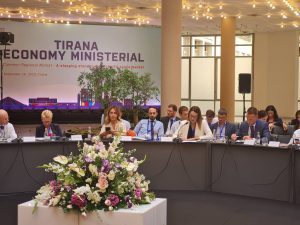Tirana – The Ministers of Economy of the Berlin process, the representatives of the European Union, and the other partners urged for the swift implementation of the Common Regional Market activities by the Western Balkans economies, that will bring concrete and direct benefits for companies and people in the region. This is particularly relevant in the light of the recently announced European Commission’s New Growth Plan for the region, which which refers to gradual integration into the EU Single Market.

The meeting titled “Common Regional Market – A Stepping Stone Towards the EU Single Market”, hosted by the Ministry of Finance and Economy of Albania, gathered key stakeholders to discuss various topics, including trade expansion, economic convergence, and payment system integration. The event was held in preparation for the Berlin Process Summit and was an opportunity for the ministers and international partners to reflect on the achievements, priorities, and main challenges in the implementation of the Common Regional Market Action Plan and the advancement of regional integration through the Berlin Process, as an important instrument for accelerating the economic convergence of the region with the European Union.
Emphasizing the crucial role of trade in boosting economies, Danijela Gačević, Acting Director of CEFTA Secretariat, pointed out the CEFTA has significantly contributed to economic growth. In 2022, the volume of trade in goods reached 8.8 billion, marking an impressive 112% increase compared to 2014. According to the Balkan Barometer, 61% of companies in 2022 reported benefiting from CEFTA, a substantial rise from the 37% in 2015. Numbers show that the region holds further untapped potential. To unlock these opportunities, CEFTA is committed to addressing non-tariff barriers, streamlining documentation for goods and services, and advancing the digitalization of trade, and in line with the EU policies and standards. “Our message is clear—there are no shortcuts on the path to the European Union. A prerequisite for further progress in this direction is the adoption of decisions that have been coordinated through the joint work of expert teams from all CEFTA Parties. Seven key decisions are awaiting adoption as a step towards further progress and creation of the Common Regional Market, our bridge to the EU Single Market” Gačević stated.
The ministers took stock of the progress made under the CEFTA framework, where 7 Joint Committee Decisions have been agreed upon, along with 7 others currently being negotiated along with one Additional Protocol. They urged for the swift adoption and implementation of these decisions to bring concrete benefits for businesses and citizens in the Western Balkans.
Ministers also called for increased efforts in implementing the Economic and Investment Plan and other initiatives, such as the CEFTA-TCT Green Lanes. They praised Memoranda of Understanding between Western Balkan economies and EU Member States for electronic data exchange at crossing points, which are designed to accelerate the clearance of goods and reduce waiting times.
Ministers reiterated that Common Regional Market Action Plan has been developed to spur economic growth development of the region and bring it closer to the EU. Founded on the four freedoms – movement of goods, services, people, and capital – it seeks to facilitate placing goods and services through recognition programmes, reduce waiting times at BCPs and Common Crossing Points (CCP) by 30%, increase mobility of people, and render payments cheaper and more efficient.
A significant part of the meeting focused on the critical role of payment systems in market functioning. Ministers expressed full political support and pledge to prioritise activities aimed at seeking SEPA (Single Euro Payment Area) SEPA membership, highlighting the importance of reducing payment costs within the region and with the EU. Furthermore, in the European Union, the Cross-Border Payment Regulation (924/2009) ensures that payment charges for cross-border payments are not higher than the ones for domestic payments, and CEFTA should aim to create similar framework for the region. Zdravko Ilic from CEFTA Secretariat underlined importance of payments for trade. „Competitiveness of our companies and standards of our people can be increased by integrating our payment systems and making trade transactions cheaper“, Ilic explained. World Bank backed this up with data showing that payments within the region are 6 items more expensive than in the EU. „Joining SEPA, but also facilitating supply of payment services and making regional QR payments, modelled after EU is a way how Common Regional Market can bring direct benefits for people and businesses and contribute to further integration in the EU“.
As Albania prepares to host the next Summit of the Berlin Process on October 16, 2023, the CEFTA Secretariat remains committed to supporting all initiatives aimed at strengthening economic ties among its Parties and facilitating their path towards EU integration. The Summit will provide a crucial platform for reviewing commitments and setting future objectives, geared towards effective and result-oriented inclusion of Western Balkan people and businesses into the EU Single Market.

